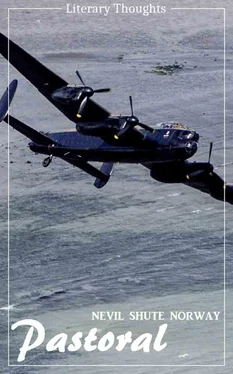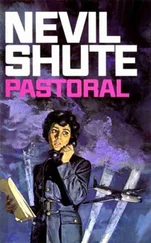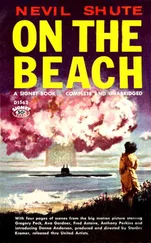Elaborately casual, Marshall said: ‘I can show you this earth any time you like. Show you the badger, too, if you like to put your hand in and pull him out.’
They laughed together. ‘Would you like to do that one afternoon?’ he said. ‘You’ve got a bike, haven’t you?’
She hesitated for a moment. ‘I’d love to see it,’ she said. ‘If I met you out there, would you show it me?’
His heart warmed to her for her discretion. ‘Sure,’ he said. ‘It’ll take you about an hour to get there on your bike. What about half past three tomorrow afternoon?’
She was suddenly frightened at his confidence. Between then and half past three tomorrow afternoon there lay an operation, a thing of darkness and of terror, of bombs and fire and flares and flak and death. Beyond that, he was making an assignment to go walking in the woods with her.
‘All right,’ she said. ‘Half past three tomorrow.’ That wouldn’t bring bad luck, would it?
He said: ‘That’s a date. Have you got a map?’
She had a map, a map on which in lonely absorption she had traced in red the solitary cycle rides that she had made around Hartley Magna. He studied it for a minute or two and then drew a little pencil circle at an intersection of two lanes. ‘There,’ he said. ‘Half past three tomorrow.’
She smiled up at him. ‘I’ll be there.’
He went back to the mess and she went over to her quarters and up to her room. She undressed partially and lay down on her bed, pulling a blanket over her. Life for her had suddenly become very full of incident. First there was the operation immediately ahead. She took her work very seriously. She had been bored with the work of training at her last station; she had wanted to be more closely in contact with the war. Now that she was at an operational station the war terrified her. From time to time when the machines were coming back from the target she had to bear quite heavy responsibilities in the fleeting moment. There had been a terrible occasion ten days previously when a crippled aircraft running short of petrol over the North Sea had appealed for a W/T fix, and when she gave it had complained, in a thin whisper of Morse, that their transmission had been weak and undecipherable. For a desperate half-hour she had laboured with a flight sergeant and two wireless mechanics to check the station transmission and to get in touch again with C for Charlie, while a stream of signals from the other aircraft were passing in and out. There had been nothing wrong with the transmission. The fault must have been some damage to the receiving set in the aircraft, but they were never to know that. That last whisper of Morse haunted her, making her more vigilant and serious about her work than ever.
Beyond the problems and the perils of the night there lay this matter of the badger’s earth, and Flight Lieutenant Marshall. At her last station she had been out from time to time with young officers, had been kissed once or twice at dances, and had taken it all with an air of detachment that showed her lack of interest. None of them had ever touched the Achilles heel, her interest in country matters. To her this little expedition to see the badger’s earth was like the opening of a door. It was a return to the sane, pleasurable matters that she had abandoned as a schoolgirl, when she had first joined the WAAFs. For the last couple of days she had been well aware that the things she liked to do were to be found at Hartley and that a young man called Peter Marshall was doing them. Now she was to join him in them, for an afternoon at any rate. For her that made an enormous difference to the Hartley scene.
She lay for some time wakeful, thoughtful, and feeling herself to be much occupied, very much involved. Presently she dozed a little. She was called at half past four and went down for a cup of tea before the briefing.
Marshall also lay upon his bed, reviewing the many calls upon his time. He was consciously and absurdly happy; this week, he felt, had been a splendid week. First there had been the big pike; he still got a thrill from the memory of the first snatching take, and the scream of his reel in the first rush. It must, he thought, be rather like catching a salmon, only in the case of the salmon it went on for half an hour or so. It was always in his mind that one day he might be transferred back to Coastal to fly Liberators over the Atlantic; if that should ever come off he would try to get a station in the West of Scotland or the Hebrides, where he could have a crack at salmon. Then there was the badger and fox business, which had been wizard.
Tomorrow afternoon there would be this expedition to the badger’s earth; he looked forward immensely to that. Everyone else upon the station seemed to think him crackers except his own crew, who had similar interests, and possibly the Wing Commander, and now Gervase Robertson.
This operation, he thought, was a bloody nuisance. Certainly it was his job and one had to do a spot of work sometimes. Still, but for that he might have been walking through the woods with Gervase at that moment, showing her things, talking to her, and watching her smile. She would have come with him that very afternoon; he was sure about that, but for the raid. Still, it was something to look forward to, to think about till tomorrow. He wondered anxiously about the weather, would it keep fine for them? He was not concerned that afternoon about low cloud in the night, or ground mists, or icing; it was only important to him that the sun should shine in Kingslake Woods at three-thirty the next day.
And, after that, there was the chance of pigeon-shooting, and he simply must contrive an afternoon to have another go at the pike before the season for coarse fish ended in a week or so, and there might possibly be other afternoons with Gervase Robertson which would take precedence over everything.
He lay for a while revolving his many occupations pleasantly in his mind, and presently he slept, to be awakened in time for his high tea before briefing.
Section Officer Robertson was on duty that night in the control office. She had taken over from her predecessor, and she was now in charge of radio and telephone communications at Hartley, working closely under the control of a flight lieutenant at Group Headquarters, Charwick. Three stations formed the Group: Charwick, Wittington, and Hartley Magna. There was a Group W/T station at Pilsey, a hamlet three miles from Hartley; this was manned for operations by the signals officers from the three stations working in rotation.
In the control building on the aerodrome a radio and telephone room opened out of the control office; this housed the R/T sets and the more secret equipment, and a small telephone switchboard. Four girls were normally on duty in this room upon an operations night, with Section Officer Robertson in charge of them, unless she was on duty at the Group W/T station, when Section Officer Ford took the control. The work was not very difficult. It mainly consisted of taking signals as they came in and marking up a very large blackboard, showing the position of each aircraft in the successive stages of its flight in order that the Wing Commander and the control officer could see the operational position at a glance.
That night the aircraft took off for Dortmund in succession between seven-thirty and eight-fifteen. Miss Robertson was busy with her chalk upon the blackboard while all that was going on; then there was a lull as the machines were winging outward to the target. At ten o’clock she gave the Squadron Leader who was serving as control officer a cup of tea and a piece of cake, and had a little meal herself, sitting at her desk in a corner of the control-room. At 10.35 the first ‘Mission completed’ signal came through, and began another round of duty for her with her bit of chalk.
Читать дальше












